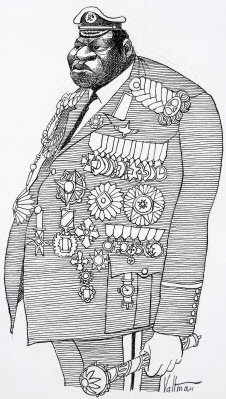 I’m pretty sure it was just a straight scam. But when there is a violent sectarian militant group involved, it is hard to be sure.
I’m pretty sure it was just a straight scam. But when there is a violent sectarian militant group involved, it is hard to be sure.
To begin with, I should have been tipped off by the fact that he knew people in Wangaratta. Not that there is anything wrong with Wangaratta as such, but making reference to a small town in your home country is a classic tactic for any con being played on foreigners. ‘Wang’ was a good choice. I once bought a very nice hat from an op-shop there — so he had me from the get go.
I was walking through the middle of Nairobi, on my way from somewhere to somewhere else, when Morris attached himself to me. As a Mzungu — or white guy — this isn’t uncommon. Sometimes people are after money, sometimes they just want to have a yarn, maybe practice their English. Morris struck me as the latter. He seemed like a nice guy. And besides, he knew people in Wangaratta.
After a couple of minutes conversation, weaving our way through honking mutatus, I learnt that Morris wasn’t from Kenya at all. Actually he was Ugandan. Morris was from the northern part of Uganda, near where Idi Amin was born. This is part of the world where civil war has raged for the last twenty years, largely carried out by child soldiers. The instigators are the LRA — the Lord’s Resistance Army — an apocalyptic Christian sect regarded as the most brutal group in Central Africa. So when Morris told me he was on the run, he had my attention.
Morris was a history teacher — a good one by the way he knew his stuff. Just a few weeks earlier his school had been torched and six teachers had died. Morris had escaped with nothing and fled to Kenya. He was a bit vague about who the perpetrators were but given the LRA have a track record for this sort of thing I made my own conclusions. Morris offered to tell me more about it over a coffee. I bought him a coffee.
So we sat at a café and I quizzed him about the destruction of his school. This is when things stopped checking out quite so well. Morris was very firm on some things but very rubbery and evasive on others. I guess it was a pretty traumatic experience. Also, for someone who had just had his life destroyed by fundamentalist Christians he tended to talk a lot about troublesome Muslims and the dilemmas of tribalism. He offered to put the full story in an email and send it to me.
By this point I was pretty sure Morris was going to ask me for money. Which is fine — no harm in asking. And of course it turned out that he needed to get to Dar es Salaam and required 3000 Kenyan shillings for the bus. I gave him the change from the coffee — 200 shillings or about $3 — and my email address and told him to get in touch. I had to go but I wished him the best of luck. Morris thanked me and stayed to finish the coffee.
So far so good. No scam there — just a guy with a very sad story. But as I walked across the street from the café, which of course Morris had chosen, I was accosted by a very aggressive man.
“What did that man tell you?” He demanded to know.
“Nothing,” I replied and kept on walking. The man ordered me to stop. He commanded me again to tell him what Morris had told me in the café. I was vague. The guy then told me that he worked for the Kenyan government. He said the man I had been talking to was not allowed to be in Kenya. He said Morris was a terrorist. So what had he told me?
Now I can’t claim to know exactly how Kenyan secret police operate, but I am fairly sure they don’t question you loudly on the street about potential terrorist suspects. Besides, whoever this guy was he certainly didn’t work for the government. I pretty quickly came to the conclusion that he and Morris were in cahoots. I told him I had a bus to catch and walked away. He didn’t follow me.
So that was the scam. I assume that the secret policeman was supposed to accuse me of funding terrorism — or something along those lines — and I was supposed to bribe my way out of it. Either that or I actually gave a Lord’s Resistance Army fundraiser 200 shillings and a cup of coffee. But somehow Morris didn’t strike me as the type. Besides, what sort of terrorist knows people from Wangaratta?
Rafiq Copeland is living in Nairobi, Kenya for a year. His column Gentlemen of Leisure, about living overseas, references Norman Lindsay’s iconic Magic Pudding







Crikey is committed to hosting lively discussions. Help us keep the conversation useful, interesting and welcoming. We aim to publish comments quickly in the interest of promoting robust conversation, but we’re a small team and we deploy filters to protect against legal risk. Occasionally your comment may be held up while we review, but we’re working as fast as we can to keep the conversation rolling.
The Crikey comment section is members-only content. Please subscribe to leave a comment.
The Crikey comment section is members-only content. Please login to leave a comment.